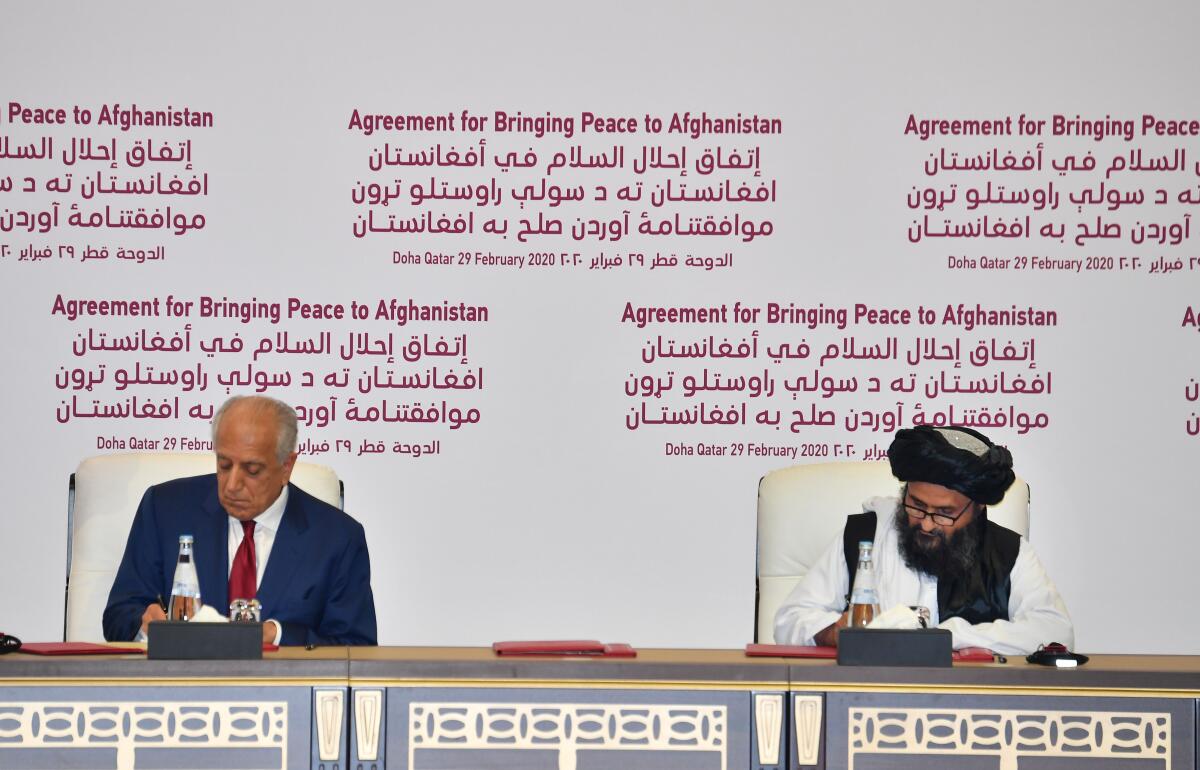The American defeat in Afghanistan

- Share via
Is “peace in our time” in Afghanistan at hand? President Trump thinks so. He described the agreement signed Saturday by an American diplomat and a Taliban official as providing “a powerful path forward to end the war in Afghanistan and bring our troops home.” We must hope that he is correct.
Yet the prospective end of the longest war in U.S. history does not find Americans dancing in the streets. With the spread of the coronavirus and the ongoing drama of the Democratic primaries, Afghanistan figures at best as an afterthought in news media and the public mind. Besides, the nation has long since grown weary of armed interventions that drag on and on as if on autopilot. No Gettysburg, no D-day — just sporadic reports of bombs dropped and people killed.
Even so, while the peace plan may not prompt Americans to celebrate, it ought to provide an occasion for sober reflection. At least for now, our instinctive urge to move on, to forget, can wait.
After nearly 20 years, the United States has accomplished exceedingly little in Afghanistan. The truth is, in this faraway Central Asian country, we have sustained a major defeat. The deal signed over the weekend, which in the details began fraying almost immediately, amounts to an admission of failure. The Trump administration’s desire to call it quits has overridden what justified a U.S. military presence in Afghanistan in the first place.
Here are the facts. Despite the loss of more than 6,000 American dead and the expenditure of roughly a trillion dollars, U.S. forces have never come close to defeating the Afghan Taliban. Indeed, government figures put the enemy-initiated attacks in the last quarter of 2019 at a nine-year high.
Programs aimed at building Afghan military and police forces able to provide security have also failed. So too have efforts to install in Kabul a unified government that commands the support of the Afghan people. There are today two rival claimants to the Afghan presidency. As for the $9 billion in U.S. taxpayer money expended to reduce the cultivation of opium, that effort has yielded essentially nothing, as a detailed report in the Washington Post made clear in December. Afghanistan today reportedly produces more than 90% of the world’s opium supply. And efforts to curb rampant corruption have come nowhere close to success, with Transparency International ranking Afghanistan among the world’s most corrupt nations.
Each of these figured as major U.S. policy objectives. None have resulted in mission accomplishment. Only with regard to the education of girls — an estimated 3.5 million are today attending Afghan schools — can U.S. efforts be said to have achieved even modest success, with political dysfunction and inadequate security putting even that modest achievement at risk.
But wait, some will say: Since U.S. forces arrived in Afghanistan more than 18 years ago the United States has not experienced a recurrence of 9/11. But this assumes a non-existent causal relationship. Taliban fighters have not been waging a global jihad targeting the United States. Their purpose remains what it was when Afghan mujahideen resisted Soviet occupation in the 1980s: They are determined to oust foreign occupying forces. If the just announced peace deal holds at all, and Trump withdraws U.S. troops as he has repeatedly vowed to do, the Taliban will have achieved precisely what they have long fought for. That’s victory.
The central lesson for the U.S. in this long and futile conflict, compounded by our experience in the Iraq War, is plain: The proper mission of the U.S. military is to deter and to defend — a statement that ought to be inscribed over the main entrance to the Pentagon, if not added to the oath of office taken by the commander in chief. Never again should it be the purpose of American forces to overthrow regimes in distant lands with vague expectations of being able to install a political order more to our liking. That way lies only more “endless wars.”
If senior U.S. national security officials can absorb that lesson, then perhaps the war in Afghanistan will not have been a complete waste. Alas, that assumes a capacity for learning that in Washington is not much in evidence.
Andrew Bacevich is a contributing writer to Opinion. He is president of the Quincy Institute for Responsible Statecraft and author of “The Age of Illusions: How America Squandered Its Cold War Victory.”
More to Read
A cure for the common opinion
Get thought-provoking perspectives with our weekly newsletter.
You may occasionally receive promotional content from the Los Angeles Times.









